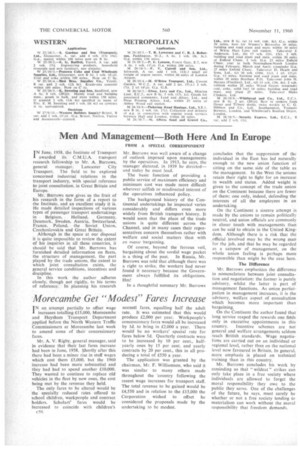Men And Management-Both Here And In Europe
Page 96

If you've noticed an error in this article please click here to report it so we can fix it.
FROM A SPECIAL CORRESPONDENT
I N June. 1958, the Institute of Transport • awarded its C.M.U.A. transport research fellowship to Mr. A. Burrows, general manager, Lancaster City Transport. The field to be explored concerned industrial relations in the transport industry, with special reference to joint consultation, in Great Britain and Europe.
Mr. Burrows now gives us the fruit of his research in the form of a report to the Institute, and an excellent study it is. He made detailed inspections of various types of passenger transport undertakings in Belgium, Holland, Germany, Denmark, Sweden, Austria, Switzerland, France, Poland, the Soviet Union, Czechoslovakia and Great Britain.
Although in the space at our disposal it is quite impossible to review the extent of his inquiries in all these countries, it should be said that Mr. Burrows has furnished detailed information on fleets, the structure of management, the part played by the trade unions, the extent to which joint consultation exists, the general service conditions, incentives and discipline.
In this work the author adheres closely, though not rigidly, to his terms of reference.. In planning his research Mr. Burrows was well aware of a change of outlook imposed upon managements by the operatives. In 1913. he says. the manager dictated, in 1939 he directed-and today he must lead.
The basic function of providing a public service of maximum efficiency and minimum cost was made more difficult wherever selfish or misdirected interest of the operatives influenced policy.
The background history of the Continental undertakings he inspected varies considerably and differs even more widely from British transport history. It would seem that the place of the trade unions is quite different across the Channel, and in many cases their representatives concern themselves rather with welfare and social matters than with en masse bargaining.
Of course, beyond the ferrous veil, bargaining about the sordid wage packet is a thing of the past. In Russia, Mr. Burrows was told that although there was a right to strike, the workers had never found it necessary because the Government always fulfilled its obligations. Hm!
In a thoughtful summary Mr. Burrows
concludes that the suppression of the individual in the East has led naturally enough to the new union function of sitting on the same, side of the table as the management. In the West the unions retain their right to fight for an increase in wealth and status. Added weight is given to the concept of the trade union on the Continent because there are fewer of them; one only, indeed, defending the interests of all the employees in an undertaking.
On the. Continent a sincere attempt is made by the unions to remain politically neutral, and union officials are commonly in closer touch with managements than can be said to obtain in the United Kingdom. Although there is a risk that the official involved may be the wrong man for the job, and that he may be regarded as a catspaw of management, on the whole union feeling is perhaps more responsible than might be the case here.
The Difference Mr. Burrows emphasizes the difference in nomenclature between joint consultation and negotiation; the former is purely advisory, whilst the latter is part of management functions. As union participation in management increases, it is the advisory, welfare aspect of consultation which becomes more important than bargaining.
On the Continent the author found that long service reaped the rewards one fidds only in executive appointments in this country. Incentive schemes are not general and welfare arrangements seldom reach British standards. Wage negotiations are carried out on an individual or regional level, rather than on the national level now favoured in Britain. In general, more emphasis is placed on technical training than in this country.
Mr. Burrows concludes his work by reminding us that " wildcat" strikes can only take place in a free society where individuals are allowed to forget the moral responsibility they owe to the public they serve. One of the challenges of the future, he says, must surely be whether or not a free society tending to materialism can work without the moral responsibility that freedom demands.
















































































































































